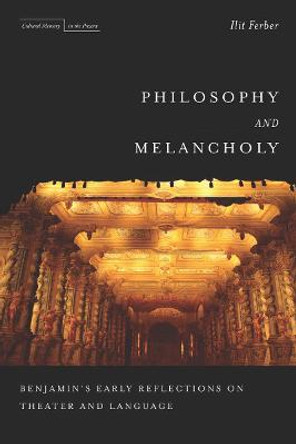Description
About the Author
Ilit Ferber is Assistant Professor of Philosophy at Tel-Aviv University. She is the author of Philosophy and Melancholy: Benjamin's Early Reflections on Theater and Language (Stanford University Press, 2013) and co-editor of three books on the philosophy of moods and on the language of lament. She has published numerous articles on Leibniz, Herder, Freud, Benjamin, Heidegger, Scholem, and Amery.
Reviews
If we attempt to know another person's pain, or understand it, to reach a common language that describes this, we will always encounter the problem that we cannot inhabit another person's body or think their thoughts. We know in the age of identity politics that this inability to inhabit another person's body is a political dilemma. But it is also the dilemma of all language. Language may describe, it may perform and communicate, but it always reaches the point where it cannot penetrate another person's world. This is where Ferber's book offers striking insights into the fundamental act of sympathy that marks language as attempting to cross an unbridgeable chasm, and in doing so, creating a strong bond of humanityFerber takes us through a clearly described, well argued discussion concerning pain,representation, expression, communication, and the interlocking of selves that is language. * Monatshefte *
Ferber...focuses on the origin of language and identifies it in, and with, the expression of pain. She rejects the view that language, and a correct understanding of it, is essentially either propositional (referring to the outside world) or performative (allowing engagement with others). Expression-primarily the expression of pain-is the cornerstone of language, and its referential and communicative functions are derivative. Ferber makes her case via an investigation of Sophocles's myth of Philoctetes, especially as that myth generated sustained analysis and interpretation by Johann Gottlieb Herder and Martin Heidegger. From this starting point of the interrelationships between the experience of pain and the genesis of language, Ferber develops connections between human language and the capacities and systems of animal communication...The book is substantive and rigorous, but the writing is clear...Summing Up: Recommended. Graduate students, researchers, faculty. * Choice *
In later chapters, Ferber performs her own close readings of the Philoctetes story, which yield more compelling arguments, in my opinion. She argues alongside Cavell that sympathy means acknowledging another's pain rather than having knowledge of it. She draws on Gide to say that pain can make for a more poetic form of language, untethered from the specificity of signifiers and interlocutors. When Ferber moves away from discourses that locate the origins of language and sympathy on the faculties of the body and, instead, encourages us to rethink the communicative and expressive functions of language and pain, this work is compelling. I am interested to see how Language Pangs might intersect with studies on pain and language in other disciplines, particularly in queer and trans studies, feminist studies, disability studies, diaspora studies, and medical humanities. * German Studies Review *
Readers have much to learn from Ferber's path-breaking book, and indeed not just at the level of theory. Early on, Ferber notes that our interpretation of pain may affect the way we experience it (8). Although this is not her express intent, by providing a new take on pain, Ferber has accordingly given us new ways to cope with it. * Journal of the British Society for Phenomenology *
Pain seems to place on us a paradoxical demand--it resists comprehension while simultaneously calling for our understanding and our capacity to hear someone's pain and respond toitaccordingly. In this book, Ferber shows that, rather than letting the paradox trap us in an impossible dilemma, we ought to revise our conceptions of language and the structures that allow us to make sense of it as a site for communicability. This book is the perfect example of what it means to be able to listen to literature, and to let it guide us through key questions in the history of thought. * Maria Acosta Lopez, Associate Professor of Philosophy, DePaul University *
Guided by sophisticated analyses of Herder and Heidegger, Ferber shows how the experience of pain, far from simply being world-destructive, as has been claimed in some contemporary scholarship, is an essential and indeed irreducible element of any language that in its world-making capacity is community-constructive. An incisive contribution to the broader renaissance of the 'expressivist' conception of language that emerges from Herder's writings, Language Pangs culminates in an exemplary reading of Sophocles' Philoctetes, where the value of literature for the advancement of philosophical reflection can be seen with the utmost clarity. * Peter D. Fenves, Joan and Sarepta Harrison Professor of Literature, Professor of German, Comparative Literature and Jewish Studies, Northwestern University *
Book Information
ISBN 9780190053864
Author Ilit Ferber
Format Hardback
Page Count 208
Imprint Oxford University Press Inc
Publisher Oxford University Press Inc
Weight(grams) 454g
Dimensions(mm) 160mm * 236mm * 20mm








